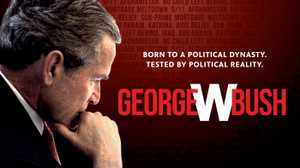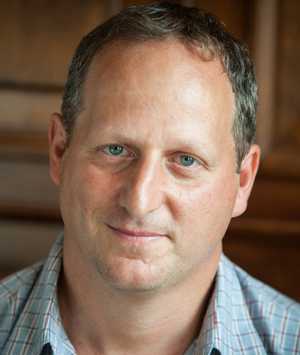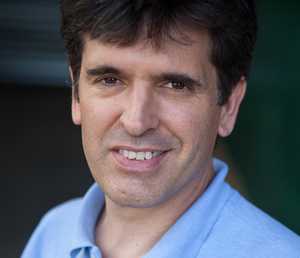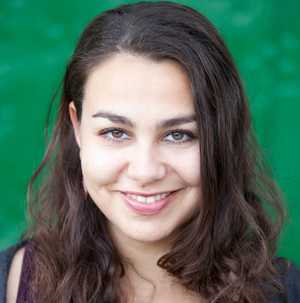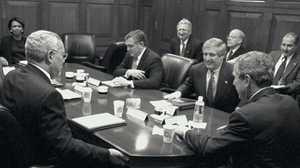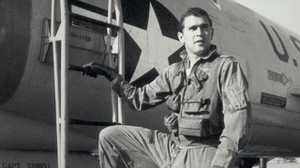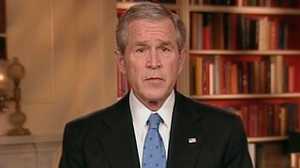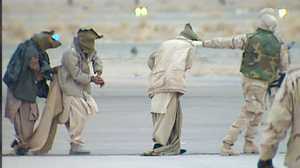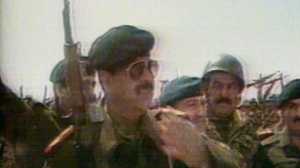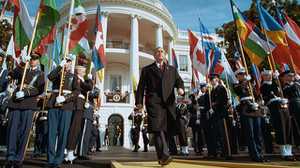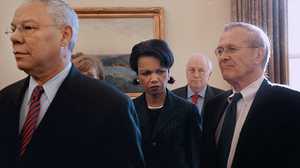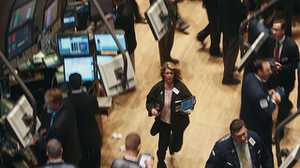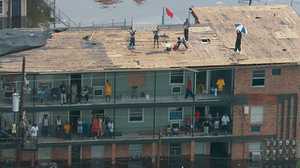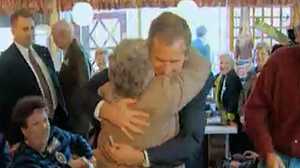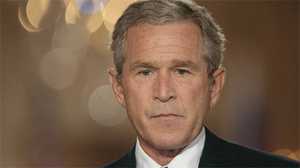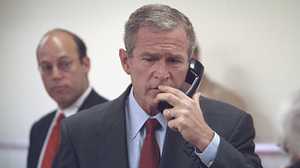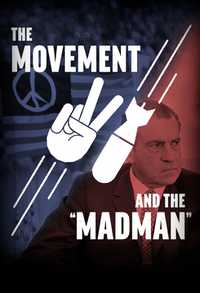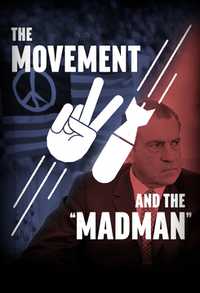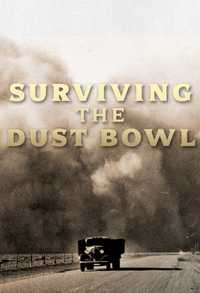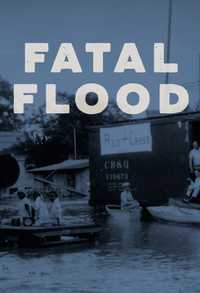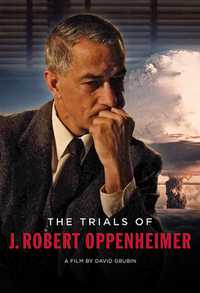SOT, Flight Tapes American Airlines Flight 11:
Betty Ong (Flight Attendant): The cockpit’s not answering. Somebody’s stabbed in business class, and um I think there is Mace that we can’t breathe. I don’t know, I think we’re getting hijacked.
American Airlines Ground Agent: Which flight are you on?
Betty Ong: Boston to Los Angeles. Hello?
Mohammed Atta: Nobody move, everything will be O.K. If you try to make any moves, you will injure yourself and the airplane. Just stay quiet.
Boston TMU: We have a problem here, we have a hijacked aircraft headed towards New — New York.
North American Aerospace Defense Command: Is, Is this real world or exercise?
Boston TMU: No, this is not an exercise, not a test.
September 11, 2001
Ari Fleischer, Press Secretary: September 11 unfolded from clear blue skies, perfect cool weather in Florida. The President went for an early-morning jog.
SOT, Bush Talking After His Morning Run:
Interviewer: How far did you go all together?
Bush: Four and a half.
Interviewer: Four and a half miles?
Bush: I think so.
Michael Morell, President’s Daily CIA Briefer: I went down to get into the President’s motorcade, and it was on the ride from the hotel to the elementary school that the first plane hit. I remember Ari turning around in the van and saying, Michael, do you know anything about a plane hitting the World Trade Center?
Dan Bartlett, White House Communications Director: We were just pulling up to the school when the first tower had been hit, and he had a quizzical look on his face. Was it bad weather? You know, he was a pilot, it didn’t make sense.
SOT: [Student reading exercises]
Narrator: While President Bush sat in the Emma Booker elementary school classroom in Sarasota, Florida, his staff was scrambling for information.
At just after 9am, Chief of Staff Andy Card interrupted the reading.
Andy Card, Chief of Staff: The teacher told the students to take out their books, and I whispered into his right ear: “A second plane hit the second tower. America is under attack.”
Ari Fleischer, Press Secretary: So I wrote on the back of a yellow legal pad “don't say anything yet.” I put my back to the press corps and I flashed the card to the President. He made one of those little nods like that.
SOT, Questions From Press In Classroom:
Male Speaker: Thank you press, can you step out the door we came in please?
Press: Mr President, are aware of the reports of the plane crash in New York?
Bush: We’ll talk about it later.
Male Speaker: Thank you all, if you could step out the door we came in.
Ari Fleischer, Press Secretary: And then we got the press out of the room where the reading was being done, assembled in the holding room.
Dan Bartlett, White House Communications Director: Immediately we have what is commonly called the fog of war.
Ari Fleischer, Press Secretary: As the President’s on a secure phone, the rest of us are working our phones, trying to figure out what we can figure out, starting to work on a statement for the President to deliver. It was controlled chaos in that room, and it was information gathering under immense, immense pressure.
SOT, Caller: I saw a large plane like a jet go immediately headed directly into the World Trade Center. It – it just flew into it, into the – into the other tower, coming from South to North. I watched the plane fly into the World Trade Center.
News SOT: We’re just getting initial reports of that, and again, we must tell you that we’re trying to get as much information but it is trickling in.
Narrator: After a brief televised address, Bush and his entourage sped toward the Sarasota airport.
Karl Rove, Senior Advisor: Normally a motorcade goes like 40 miles an hour. We got on the highway, and we were doing 85 miles an hour. Little was said.
Narrator: In the car, Bush learned a third plane had been hijacked, and flown into the Pentagon.
Karl Rove, Senior Advisor: The phone rang and the President picked it up and began talking. I could only hear one side of the conversation, but I knew it was bad when he said, “is Rumsfeld alive?”
Michael Morell, President’s Daily Cia Briefer: We got back to the airport and I remember seeing Air Force One ringed by secret service agents with automatic weapons visible. And I had never seen that before. I remember getting on the plane and I remember the plane taking off much more rapidly than it usually took off and ascending at a very steep angle.
Ari Fleischer, Press Secretary: The President wanted to get back to Washington, he thought it was important for the nation to see the President back in Washington. At the same time, it was the last thing the secret service would ever want to happen.
Richard Clarke, Counter-Terrorism Coordinator: We did not want to bring the President back into what, frankly, was a war zone.
There were F-15s circling the White House, armored vehicles, like tanks. The Pentagon had blown up. Most of the city had been evacuated. We didn't know what was yet to happen. The White House might be a target for such an airplane attack.
Narrator: In the President’s absence from Washington, Vice President Dick Cheney assumed operational control of the federal government from a secret bunker under the White House, where he was patched through to Air Force One.
Josh Bolten, Chief of Staff: There were several occasions when the Vice President was talking to the President and they got cut off. The communications were frustratingly primitive.
Narrator: Straining to hear each other, Bush and Cheney discussed what to do with planes still in the air, some of which were not communicating with ground control.
Bush directed Cheney to ground every flight in US airspace.
But one plane did not heed the order.
Josh Bolten, Chief of Staff: United Flight 93 was not responding to communications and was now headed toward Washington, DC.
Narrator: After consulting with Cheney, Bush authorized fighter jets to shoot down United Flight 93.
Josh Bolten, Chief of Staff: It was quiet around the table because everybody appreciated the gravity of that moment. We were dispatching the US military to shoot down a civilian aircraft loaded with innocent Americans.
SOT, Mission Crew Commander 9/11 Recordings:
Pilot: The region commander has declared that we can shoot down aircrafts that do not respond to our directions. Copy that?
MCC: Copy that. The Vice President has cleared .
Josh Bolten, Chief Of Staff: We didn’t hear anything about what happened to it for some time until eventually, we heard that as it turned out it was a bunch of brave American civilians who brought that plane down on their own.
Narrator: Although the President insisted on returning to Washington, the Secret Service remained adamant that it was not yet safe.
After a brief stop to refuel in Louisiana, Air Force One, flying at 45,000 feet and zig-zagging to avoid a possible missile attack, headed for Offutt Air Force Base in Omaha, Nebraska.
Richard Clarke, Counter-Terrorism Coordinator: We put him in one of the most secure places we could, the headquarters of strategic command. We had a video set up so that we could talk to him, and we could see him walking into the bunker. He looked very determined, he sat down, and before anybody could say anything, he looked at us, up on the TV screens and said, “I am coming back to Washington. Don’t argue with me. I’m coming back. Now!”
Narrator: By 4:30pm, Air Force One was headed back to Washington.
Dan Bartlett, White House Communications Director: I’ll never forget the images arriving into DC airspace on Air Force One, with two fighter jets so close to our wings you could see the stubble of the beard of the pilot, and then to look down on our nation’s capital and it just be deserted, and seeing smoke billowing out of the Pentagon. You could have heard a pin drop on that airplane. In all the chaos it was eerily silent.
Narrator: Finally back at the White House, Bush and his team readied the most important speech of his presidency so far, which he would deliver to the nation that night.
Dan Bartlett, White House Communications Director: There was a lot of debate internally about what was the appropriate message. It was certainly clear to President Bush that his presidency was fundamentally altered on that day.
SOT, Bush Oval Office Address, 9/11: Today our fellow citizens, our way of life, our very freedom, came under attack in a series of deliberate and deadly terrorist acts.
Narrator: Mid-way through the speech, Bush made a statement that would lay the groundwork for a sweeping war on terror, shifting the course of American foreign policy and defining his presidency.
SOT, Bush: We will make no distinction between the terrorists who committed these acts, and those who harbor them.
Narrator: In the span of just over 12 hours, a President who had been scorned as inexperienced and unprepared, overshadowed by his father and unappreciated by the country, had been thrust into a crisis the likes of which few presidents had ever faced.
Ari Fleischer, Press Secretary: He became a war president, as he would put it.
The nation rallied because we were attacked, but I think the nation also had question marks about its nine-month long president at that point. Who are you? What will you do?
Houston, 1970
Narrator: Little in the past of George Walker Bush had prepared him for the challenges he would face after 9/11, nor inspire much confidence that he would rise to them.
Wayne Slater, Journalist: George Bush was almost the perfect example, if not the wastrel, the profligate kid, the good-time Charlie, the wonderfully engaging friend, and fraternity brother that you've met a thousand times.
What he wasn't, at least to my mind, was someone who would emerge as Governor of Texas or President of the United States.
Narrator: In 1970, twenty-four year old George Bush was far from the Washington fast track -- often found poolside at Chateaux Dijon, an apartment complex catering to the young and single where he lived in Houston.
Charlie Younger, Childhood Friend: He was kind of drifting, to be honest with you. I don't think he had a focus on where he was heading. I don't think he had a regular job, you know, that was a career path for him.
Wayne Slater, Journalist: He had to figure out what he wanted to do, and he wasn't doing it very quickly. Mostly, he was drinking, carousing, and having fun.
Robert McCleskey, Childhood Friend: He’d drink too much, and he could really be obnoxious when he drank too much. For lack of a better word, he could be a real asshole when he drank.
Narrator: Bush’s father, George Herbert Walker Bush, was a political star in the Republican Party.
Peter Baker, Journalist: At this point his father is in a succession of appointed jobs from Richard Nixon and Gerald Ford. Ambassador to the United Nations, Republican Party chairman, ambassador to China, and finally, CIA director. [2]
SOT, Bush: It’s a whole new realm of life for my dad and our family. Having been in elective politics you kind of deal in one area, and now in international politics, I think it’s going to add so much more breadth to this man’s life and it’s fantastically exciting.
Peter Baker, Journalist: He is the height of American government. Diplomacy, foreign policy, he’s dealing with weighty issues. And back home, his son is trying to find himself.
Narrator: Father and son were often at odds over W’s waywardness.
The situation reached its breaking point during the Christmas holidays in 1972. After a night of heavy drinking, Bush crashed into his neighbor’s garbage cans. His 16 year-old brother Marvin was in the car.
When his parents confronted him, Bush revealed a seething resentment, challenging his father to a fight.
Peter Baker, Journalist: The father was always measuring the son, and the measuring, of course, is what makes it so hard for, you know, the firstborn of a storied family. They share a name, they share a family, they share a legacy. It is possible to overstate the level of tension there, but it is important to understand who they are.
Narrator: W, or Little George, as his family called him, was born in New Haven, Connecticut, on July 6th, 1946, while his father was studying at Yale.
Peter Baker, Journalist: His father is from a family that mixed with the Roosevelts and the Vanderbilts and the elites of American society. No pressure, right? But here is the inheritor of a dynasty, in effect.
Ron Suskind, Journalist: My God, George W. Bush grows up with his insanely accomplished dad. He’s the captain of every team he’s on, from Yale baseball on forward.
Peter Baker, Journalist: His father was the youngest Navy aviator in the Pacific. He was shot down over the ocean. Two of his crewmates died. He survived and was rescued by a submarine.
Narrator: After graduating from Yale, George H. W. Bush, or Poppy as he was called in the family, set about building up his own fortune, moving his wife Barbara and young son from Connecticut to Midland-Odessa, Texas, where the oil was gushing.
Bill Minutaglio, Writer: This wasn't, you know, Connecticut, they parachuted into a foreign country. It was just a culture shock, and out in far West Texas, where people literally were chewing tobacco, where literally tumbleweeds would come tumbling by.
Narrator: But, little George was very much at home in Texas. “The word I'd use is idyllic,” he recalled of his childhood home. ”When I would speak about the American Dream, it was Midland I had in mind."
In 1953, tragedy would strike the family when Bush’s three year-old sister Robin died after battling Leukemia. Barbara Bush fell into a deep depression.
Peter Baker, Journalist: His father responded by working even harder and not being around very much so it was left to George W. to be the comforter to his mother. He told jokes, he cracked wise, he was trying to get her to smile. And it became a lifelong trait for him, you know. The cutup. The class clown.
He was a bit of a scamp. He was a bit of a trouble maker. He got in trouble when he was caught with a cigarette. He got in trouble when he crashed the family car when he was 14, twice.[3]
Narrator: “Georgie aggravates the hell out of me at times,” an exasperated Poppy would complain. “But then at times I am so proud of him I could die.”
Narrator: Like all Bush boys, George was sent to prep school at Phillips Academy in Massachusetts. Unable to match his father’s exploits on the baseball diamond, Bush concentrated on his social skills, becoming head cheerleader.
Upon graduation, he followed two previous generations of Bush’s to Yale University.
Peter Baker, Journalist: He doesn’t have his father’s history, he doesn’t have his father’s academic or athletic skills, so he becomes a student of people, a student of other kids.
Clay Johnson, Classmate: He is a people person. He was friendly, warm, humorous, uh, but had this fantastic, genuine interest in people.
Narrator: Bush spent most of his time at Yale drinking, socializing, and studiously ignoring the growing discord in the country over the war in Vietnam.
But by 1968, Bush’s senior year, he could no longer hold the outside world at bay.
The campus was roiled with protests. Bush knew that with commencement, he would lose the academic deferment that had shielded him from the draft.
Bill Minutaglio, Writer: In his heart of hearts he did not want to go to Vietnam but he knew damn well that his father's next step had been to join the military and then become a war hero.
Narrator: To avoid combat in Vietnam, Bush joined the 147th Texas Air National Guard, along with other sons of wealthy and well-connected Texans. Though Bush proved an able pilot, he was never tested in battle. The 147th, it was said, would only see action if Oklahoma decided to invade Texas.
Bill Minutaglio, Writer: Some people derisively called it a champagne unit. Certainly Bush had help getting into the National Guard. It was a matter of privilege and access.
Narrator: Decades later, questions would surface whether Bush had pulled strings to join the 147th, and whether he left before fulfilling his full term.
But in 1970, he was honorably discharged, a fighter pilot who had never seen combat.
Peter Baker, Journalist: At each stage, you know, he’s following his dad’s footsteps, each stage never as successful as the dad.
Narrator: With little direction of his own, Bush remained on the course his father had set; this time seeking his fortune in the Texas oil fields.
After earning an MBA from Harvard Business School in 1975, W procured some seed money from the family and returned to Midland.
Wayne Slater, Journalist: It was an opportunity to duplicate his father's success in the oil business. But it was also a place, I think, he felt comfortable immediately. This is who I am. I'm a guy who's wearing cowboy boots. I'm a guy who knows what a pumpjack is and can go down to the Midland diner and eat with anyone.
Charlie Younger, Childhood Friend: He probably was tired of drifting, if that's a good term, so he came to Midland with a singular focus, I think.
Narrator: In Midland, Bush formed his own oil exploration company, named “Arbusto,” Spanish for “Bush.” He drilled across West Texas looking for a big strike.
But as he worked to get Arbusto off the ground, W found himself tempted by yet another Bush family tradition.
SOT, Bush:
I’m George Bush, running for the Congress.
Charlie Younger, Childhood Friend: This group of conservative Midland oil men thought he would be a good candidate. They encouraged him to run, and he accepted the challenge, and he was a natural.
Wayne Slater, Journalist: While it was way premature for someone who, relatively speaking, just got there, his life was a pattern, and part of that pattern was duplicating the father's successes, but at the same time defining himself in the West Texas tradition as his own man.
Narrator: A few weeks after announcing his candidacy, Bush attended a backyard barbecue where a pretty young librarian named Laura Welch caught his eye. “If there is love at first sight,” Bush would later write, “this was it.”
Robert McCleskey, Childhood Friend: I don’t know that anybody would have put them together at all. They just were two totally different personalities. Most people that knew both of them were surprised.
Barbara Perry, Historian: This is clearly a case of opposites attracting: the quiet, somewhat shy introverted school librarian meets up with the wise-cracking, rough-edged, cowboy persona, hard drinking George Bush.
As he put it, she was beautiful, she was elegant, she was smart, and he said, "she accepted my rough edges and helped to smooth them."
Narrator: No sooner had they married than the couple was back out on the road, driving the West Texas district from Lubbock to Abilene.
SOT, Bush: That campaign was my first year of my marriage. It was like honeymooning on the campaign trail.
SOT, Bush 1978 campaign advertisement: I feel sure I can be an effective congressman. I’ll listen to you, I’ll work hard for you, and I’ll introduce and vote for legislation that’s in our best interest. Together we can do a lot for West Texas.
Peter Baker, Journalist: He was running against a Democrat named Kent Hance and Hance just portrayed him as a, as an outsider, somebody from New England and Bush had to prove himself as being an authentic Texan.
Kent Hance, Political Opponent: We put a theme of I’m one of you, and he’s not, he’s an outsider. We tried to make it a race of Texas Tech versus Yale.
Peter Baker, Journalist: He has to answer for it. He has to answer for this New England family he’s trying to escape from in some ways.
Narrator: With Poppy’s help, W’s campaign broke Texas state fundraising records, but along with the money came charges of nepotism.
SOT, Hance: You look at the four fundraisers he’s had and the fact that his dad’s there. That definitely helps him raise money.
SOT, Bush: It’s amazing to me that here we are running for an important position and we’re now talking about whether or not people in the 19th congressional district are confusing me with my dad.
Narrator: Although the race was closer than anyone expected, Bush’s congressional run ended in defeat.
Kent Hance, Political Opponent: He used to say that we tried to “good-old-boy” him to death. Uh, we did “good-old-boy” him but I’ll say this. After the race was over he said he’d never be “out-good-old-boy-ed” again in the state of Texas.
Narrator: After his congressional loss, W returned to the oil business, now suffering through a prolonged slump.
George and Laura were also struggling to start a family, and had begun interviews with a Fort Worth adoption agency. They were well into the process when Laura learned she was pregnant with twin girls.
Jenna and Barbara Bush were born in 1981, each named after a grandmother.
With a young family to provide for, Bush was ever more pressured to make a big strike, and ever more frustrated by his repeated failures.
His company, some joked, should change its name from Arbusto to “Ar-BUST-o.”
Charlie Younger, Childhood Friend: It's very risky. You know, you can be a millionaire one day and absolutely broke the next day. It was always better to be lucky than good. I mean let's face it, he wasn't particularly lucky.
Peter Baker, Journalist: He’s ranked, I think, in the 995th biggest oil company in Texas or something like that. At one point he says, “I’m all name and no money.”
Michael Gerson, Chief Speechwriter: I think his friends and family when he was nearly 40 years old were worried about what he was going to do with his life. He drank too much and he had very little direction.
Narrator: Feeling lost, Bush began to attend a weekly bible study session at the suggestion of some friends.
The program was called Community Bible Study and was a scriptural boot-camp.
Peter Baker, Journalist: Bush, he’s looking for something, right? He’s seeking out direction, meaning, understanding. Religion begins to give him that definition, that path forward.
Wayne Slater, Journalist: The oil business was up and down, and there was a kind of spiritual sense in Midland, an understanding that things go down, but they will go up, and that fundamentally you must have faith, and part of that faith was a Christian faith.
Charlie Younger, Childhood Friend: He transitioned from a churchgoer to a Christ follower and wanted to emulate the tenets and teachings of Jesus Christ, and he made a definite transformation there.
Narrator: Armed with a newfound faith, Bush finally addressed one of his lifelong demons: alcohol.
The decisive moment would come after Bush’s 40th birthday party.
Charlie Younger, Childhood Friend: He woke up hungover, he'd overdone it the night before, and he didn't feel good, and I think Laura told him that he could have behaved better. He just said I don't need this in my life, it's robbing me of my energy, it’s taking too much of my time.
SOT, Bush: “Well, I quit because at times I thought I liked to drink too much. Somebody said to me, “can you think of any day you haven’t had a beer?” And I couldn’t.
Charlie Younger, Childhood Friend: I think another big factor is he didn't want to be an embarrassment to his dad. And it’s always been a driving force in his life.
Narrator: After serving two terms as Ronald Reagan’s Vice President, George H.W. Bush was the GOP’s leading candidate for the 1988 presidential election.
With a White House bid would come increased scrutiny of the entire Bush family.
Peter Baker, Journalist: His father was gearing up to run for President. A bad incident by his son would reflect terribly on the father. It’s that fear that helps him finally get his act together.
He sells his oil business, he moved to Washington, and he joins the campaign. And he has no title. His dad says, ‘you don’t need a title, you’re my son.
SOT, Bush: What time is it? It’s victory time! This is the non-political part of this.
Peter Baker, Journalist: This is a moment that begins to change their relationship. His father begins to trust his son, and give him responsibility knowing he can rely on him, and for W, he begins to sort of shed some of the baggage that had been there in the past.
News SOT: George Bush is the 41st President of the United States.
Doug Wead, Spiritual Advisor: After the ’88 election, he started talking about who’s going to go where, who on the staff is going to go to the inaugural committee, who’s going to go to the White House, and in the middle of that conversation, he pauses, and he says, “What’s going to happen to me?”
SOT, speaker unknown: First child, of the first family, George Bush Jr.
R.G. Ratcliffe, Journalist: There was sort of a push for both him and his brother
Jeb to go into politics. The family kind of favored Jeb. George had been sort of the ne’er-do-well son.
SOT, Barbara Bush: Jeb is our politician. He’s the Republican county chairman of Dade County, Florida, Miami. You oughta ask Jeb, don’t skip him.
Narrator: W. felt overlooked and unappreciated.
“My pool has been expanded so much because of who my Dad is,” Bush would tell a reporter. “The advantage is that everybody knows who I am. The disadvantage is no matter how great my accomplishments, no one is going to give me credit for them.”
While his father prepared to move into the White House, Bush returned to Texas, and for the first time, set out on a course of his own.
Wayne Slater, Journalist: The opportunity came up to buy the Texas Rangers baseball team. And there was no question I think, in his mind, that there was a political calculus in the sense that this can’t hurt.
SOT, Bush: We’re fixing to build the best baseball park ever built.
Peter Baker, Journalist: He didn’t have enough to buy a baseball team, so what he does is, he does what he does best, he networks. Pulls together, tens of millions of dollars by other people’s money, and he becomes sort of this fixture at the ballpark.
Wayne Slater, Journalist: Bush, being Bush, put on his Texas Rangers cowboy boots, and got a seat not up in the box, not where the owners usually sit, but down there where the rest of the fans sat, and that's where he was, game after game.
SOT, Bush: It really is the most fabulous place to watch baseball ever built.
Wayne Slater, Journalist: And he became a really beloved figure for the Texas Rangers. Now, Bush could say I did this on my own, I'm my own man.
Charlie Younger, Childhood Friend: There was one little other subtle thing. While he was partner with the Rangers, he went to all 254 counties in the state of Texas in the name of promoting Rangers baseball, but he was also getting name recognition in all 254 counties and I think that would fend him well in any future statewide political run. I think that was another motive.
Narrator: In 1992, Poppy’s long political career came to an abrupt and shocking end with his reelection defeat by the dynamic Arkansas governor, Bill Clinton.
SOT, Bush 41 speaking on election night: There is important work to be done, and America must always come first.
Barbara Perry, Historian: The loss to Bill Clinton was a blow to the whole family. Uh, I just don't think they ever thought that the war hero, George H.W. Bush, the statesman that he was, could lose to the baby boomer, draft-dodging, marijuana-smoking Bill Clinton. They were devastated by it. But as one door closes, another door opens. It turns out that for George W. Bush, this would be the door opener for him.
Narrator: Just days after his little brother, Jeb, declared his candidacy for Governor of Florida, W. announced his own in Texas.
SOT, Bush’s announcement: Let’s make it official. I’m a candidate for Governor of Texas.
Narrator: He would be challenging Ann Richards, the popular Democrat incumbent and long-time nemesis of the Bush family.
Peter Baker, Journalist: He’s going to run against the very person, Ann Richards, Democratic governor, who had mocked his dad so viciously, in his view, at the Democratic Convention.
SOT, Ann Richards at DNC: Poor George. He was born with a silver foot in his mouth.
Charlie Younger, Childhood Friend: A lot of people, myself included, thought that she'd be very hard to beat. But he said I'm going to run, and I'm going to beat her. I think that he wanted to even that score.
R.G. Ratcliffe, Journalist: Ann Richards was a stage persona. I mean she was charismatic, electric, she was funny, she was quick witted. And she could be really mean.
SOT, Ann Richards: You know, I have a fella who is challenging me for Governor, and I am sure…thank you. And I really and truly, and I have said a million times, I know he means well and if he would start by running for the city council or for...
Doug Wead, Spiritual Advisor: Inside the family, I think they were a little nervous, because they were afraid he’d fail at it, and he knew that, which drove him on all the more.
Narrator: On the surface, Richards looked unbeatable, an incumbent with an approval rating in the high 60’s.
But Bush had an edge - the help of a clever Republican strategist named Karl Rove.
Rove was a longtime associate of Poppy’s and one of the most formidable and ruthless strategists in the country
He had been captivated by W. since their first meeting in the 1970’s.
Karl Rove, Senior Advisor: In walks this guy in his National Guard Air Flight jacket wearing cowboy boots and Levis, exuding more charisma than anybody should and he was smart as heck. I mean, I know the reputation, the good old boy from Midland, the village idiot. But, here’s a Yale history major and a Harvard MBA.
Lawrence Wright, Journalist: He was a screwup at the time. Karl saw something in Bush before anybody else did. He was smitten.
Narrator: W. was central to Karl Rove’s vision of a solid red Texas. Someone who could appeal to centrist Democrats and Republicans alike. For Bush, Rove was the strategic brain who could take him to the political heights he dreamed of.
Lou Dubose, Writer: I mean, Karl Rove was pygmalion and he created George W. Bush. He saw that this was a kind of ruggedly handsome guy, young man, who could be groomed for something greater. He convinced George W. Bush he was that candidate and then he made him that candidate.
SOT: I have spent eleven long, long joyous months campaigning all over the state. My mission was to tell Texas that there is another George Bush in this state. And I have been able to do so.
Wayne Slater, Journalist: The only thing George W. Bush doesn't have is any knowledge of how government works. And so what Rove did is recruited experts, and put Bush onto a series of lessons that went for months, in which he learned about the budget, and he learned about taxes. Learned how to answer questions.
Karl Rove, Senior Advisor: Every politician, if they’re smart, recognizes they need help. He kept going around saying ‘I’m a capitalist!” You know, Mr. Bush, you maybe oughta stop saying capitalist and start saying, “I believe in free enterprise and I’m a businessman.”
Wayne Slater, Journalist: Ann Richards knew that George W. Bush could run a good race against her, but she underestimated him because she thought he was dumb.
Karen Hughes, Counselor To The President: He just relished that. He's self confident enough that he didn't let that get to him.
He made fun of it, and was able to let it roll off his back.
SOT, Richards: Unless you can put a dollar figure to what you propose and then tell the people how you are going to pay for it, you are being inexperienced at the cost of the taxpayers’ of Texas.
SOT, Bush: The incumbent Governor of the State of Texas is spending all her money on TV, trying to make me something I’m not. We ought to be discussing welfare reform, juvenile justice, education, ways to make Texas a better place for our children.
Narrator: Bush’s discipline took the Richards campaign by surprise.
Lawrence Wright, Journalist: One thing that Bush was capable of doing is staying on message. He just never went outside the lines. He was an incredibly disciplined candidate.
Narrator: By election day, he was polling higher than anyone had thought possible.
R.G. Ratcliffe, Journalist: Running for Governor was important to Bush for his own self validation. To win an office, do it on his own, and kind of prove to his parents that he could be as good as Jeb was.
News SOT: Their younger son Jeb lost a close race for the Governor of Florida.
R.G. Ratcliffe, Journalist: Surprise surprise, Jeb lost and George won.
News SOT: A race that was supposed to last well into the night was over early.
Karl Rove, Senior Advisor: Lots of people are cheering and getting excited. Lots of friends of his are in the room and he wants to go talk to his parents. So he motions to me and he walks into the, to the bathroom and calls up his dad. It's clear his father's just in complete meltdown about Jeb losing and finally, the now governor-to-be of Texas, said, “Well, Dad I won.”
Narrator: On January 17, 1995, George W. Bush was sworn in as governor of Texas.
SOT, Bush inauguration: So help me god. So help me god
Narrator: Bush was just the second Republican governor elected in Texas in over 100 years.
He would soon have to hold his own against the entrenched Democratic powers who ran the state legislature with an iron hand.
Karl Rove, Senior Advisor: The governor of Texas is constitutionally weak. The speaker and particularly the lieutenant governor are all-powerful. Literally no bill can be brought up without the permission of the lieutenant governor. And the lieutenant governor was Bob Bullock, who was strong as an acre of garlic. [6]
Lou Dubose, Writer: He was meaner than a snake. He was intimidating. Senators described his drive-by ass-chewings.
Narrator: To Bullock’s surprise, Bush approached him with an olive branch.
Dan Bartlett, White House Communications Director: George W. Bush didn’t come in acting like he knew everything. He listened. And I think Bullock probably didn’t expect that.
Lou Dubose, Writer: George W. Bush and Karl Rove seduced him. They courted him. They worked him. And he came to hold Bush in really high regard, and in the end was something of a political godfather.
Narrator: With Bullock’s support, Bush sailed through his first term -- easily fending off a Democratic challenger for re-election in 1998.
Lawrence Wright, Journalist: It was Bob Bullock who was the first person to declare on Bush’s 50th Birthday: “We're looking at the next President of the United States.” Nobody had ever said that. And, it was a democrat. It was a leading Democrat in the state. It was a kind of anointing.
Narrator: By the mid-1990’s, the one time good old boy, the Bush family’s black sheep, was being seriously discussed as a Republican presidential candidate.
Karen Hughes, Counselor to the President: I got a call one day from, uh, from a reporter and they were asking me about a poll that shows your boss as the front-runner to be the GOP nominee for President. I made a beeline for his office and he said, what? We were both kind of incredulous. And then it sort of snowballed from there.
Lawrence Wright, Journalist: People began to look at him as a presidential contender. But he thought he wasn't ready. He told his friends and you know, he felt like a cork in the river that it was just, it was carrying him along almost without his own volition.
SOT, Bush: I come here under no illusions. I know expectations are sky high. But I got a pretty good reminder about life its own self when my daughter, one of our twins said, “Daddy, I’ve been reading the polls. You’re not nearly as cool as cool as the people think you are.”
Karl Rove, Senior Advisor: We built up a gigantic fundraising apparatus outside of Texas. So we went to California, we went to New York. We took his dad’s network.
SOT, Bush: I’m running for President of the United States. There’s no turning back.
Karl Rove, Senior Advisor: He had Harvard Business School classmates that were being successful all around the country.
SOT, Bush: And I intend to be the next President of the United States.
Karl Rove, Senior Advisor: Baseball friends. We had his brother’s network by then.
Wayne Slater, Journalist: There was an early announcement of the campaign contributions. And it was stunning. It was so many millions of dollars, that was simply beyond anything anybody expected.
Narrator: By the summer of 2000, Bush had built an insurmountable lead in the Republican race.
But as he accepted the nomination of his party, he knew he faced an uphill battle to defeat the Democratic candidate, Vice President Al Gore.
Peter Baker, Journalist: Al Gore is running to succeed a popular President. Bill Clinton had been impeached but his approval ratings were in the 60s. So once again Bush is kind of taking on, in effect, an underdog role.
Narrator: Bush had always done best when least was expected. In the fall of 2000, he took to the campaign trail criss-crossing the country with the energy of a Texas twister.
Peter Baker, Journalist: He felt very comfortable on the campaign trail, he enjoyed it, he enjoyed being with people, he was a classic extrovert in that sense, he got energy from other people.
SOT, Bush: We need a leader to bring Republicans and Democrats together to reform...
Josh Bolten, Chief of Staff: One of the best one-on-one politicians of the modern age and was always a frustration to those of us who worked for him that that didn’t always communicate through mass media.
Narrator: While Bush shined when face to face with voters, on television he often seemed unready to be President.
SOT, Bush: If you are a single mother with two children, which is the toughest job in America as far as I’m concerned, and you’re working hard to put food on your family.
Michael Gerson, Chief Speechwriter: The American public was seeing someone who had not spent their entire life in politics. I mean, he went into politics as a middle-aged person and he didn’t have a set of acting skills that a lot of other politicians had developed over time, so you did get certain gaffes.
SOT, Bush: I want to make it clear to people that, you know, the idea of putting subliminable messages in the ads is... is ridiculous.
We cannot let terrorists and rogue nations hold this nation hostile or hold our allies hostile.
More nations have nukular weapons, and still more have nukular aspirations.
Colbert: That guy mispronounces everything.
Wayne Slater, Journalist: While his opponents howled what a clown he was...
SOT, Bush: I know that human beings and fish can coexist peacefully.
Wayne Slater, Journalist: ...he never really worried that this was going to cost him a single vote.
People were gonna vote for him because he, George W. Bush, why he’s just like we are.
Eugene Robinson, Journalist: If you think about it, it is quite a trick for this man who was born to wealth and power in the sort of most exclusive eschalon of American society, to somehow convince a lot of voters that he was just a regular guy.
Narrator: His missteps also played into a key strategy - one that had served Bush well for much of his political life - to set expectations low and consistently surpass them.
But Bush knew his inexperience was a vulnerability, particularly on foreign policy and national security.
SOT, TV interview: Interviewer: Prime Minister of India?
Bush: Uh the new Prime Minister of India is uh… uh no.
Narrator: He’d need to compensate by weighing his ticket with a seasoned Vice President, someone with unquestionable bona fides.
SOT, Bush: So I’m proud to announce that Dick Cheney, a man of great integrity, sound judgement and experience is my choice to be the next Vice President of the United States.
Narrator: For Bush, there was only one choice: Dick Cheney, a veteran of Congress who had served as his father’s Secretary of Defense.
Robert Draper, Journalist: There’s no question as to what drew Bush to Dick Cheney. There were two qualities. First, Cheney was experienced. Second, Cheney did not have presidential ambitions. So Bush would never have to look over his shoulder.
Narrator: After initially declining, Cheney finally agreed, but only after extracting a pledge that he would be given unprecedented power and access.
Barton Gellman, Journalist: He would be welcome in any meeting, that he would have a strong voice in foreign policy, defense policy, economic policies. He turned it into a much more attractive job before he accepted it.
Narrator: While the selection of Cheney lent gravitas to the ticket, Bush still needed to prove that he could go toe to toe with Gore.
The public saw the two men square off in the first of three nationally televised debates.
As Bush took to the stage, expectations were at historic lows, exactly where he and Rove wanted them.
Dan Bartlett, White House Communications Director: The most decisive moments in a presidential campaign always seem to come down to the debates. That’s really where Al Gore really got pretty bollocksed up.
SOT, Bush: Well, we do come from different places. I come from West Texas.
Peter Baker, Journalist: Al Gore is seen rolling his eyes and sighing at the things that George W. Bush is saying and kind of looking down at Bush, who of course is not as practiced or as knowledgeable about national and international issues as Gore is. It looked kind of, you know, condescending and unappealing.
Narrator: As election day approached, polls showed that Gore’s once significant lead had vanished, and Bush had vaulted ahead. The mood in Bush’s camp was ecstatic.
Then, with just days remaining, a long-buried secret suddenly surfaced in the national media.
Dan Bartlett, White House Communications Director: It was actually a staffer on my team who came to me. And he says hey, Bartlett, you're not going to believe this, but there’s this Fox affiliate up there who claims that they have evidence of a DUI.
SOT, Bush: Obviously there’s a report out there tonight that 24 years ago, I was apprehended in Kennebunkport, Maine for a DUI. That’s an accurate story. I’m not proud of that. I’ve often times said that years ago I made some mistakes, occasionally drank too much, and I did on that night.
Dan Bartlett, White House Communications Director: We always knew this was going to be close. But there was a sense that weekend when you saw the polling numbers, that this hurt and that this was gonna make it a real nail-biter.
Narrator: The 11th hour revelation had hurt Bush, but no one knew exactly how much.
On election night, Bush retreated to Texas with his family to watch the returns.
Karl Rove, Senior Advisor: He was at the Governor’s Mansion. He’s surrounded by family and friends. I was in my office at the campaign. Early returns come in obviously, Indiana, Kentucky, we’re looking okay, we’re looking good.
But Florida, you know, Jeb had been nervous about Florida, and we’re watching Florida and then we get the early call on Florida.
News SOT: A big call to make. CNN announces that we call Florida in the Al Gore column. This is a state both campaigns desperately wanted to win.
JOSH BOLTEN, Chief of Staff: Karl believed, and persuaded all of us, that the networks were – were getting it wrong.
Peter Baker, Journalist: They called it for Gore at first and that looked like it was it. That looked like it was over.
News SOT: Stand by. Stand by. CNN, right now, is moving our earlier declaration of Florida back to the too-close-to-call column.
Josh Bolten, Chief of Staff: Projections start changing and it goes to, we don't know, Florida is a toss-up. And then one of the networks came out and called it for Bush.
News SOT: At 18 minutes past 2 o’clock eastern time, CNN declares that George Walker Bush has won Florida’s 25 electoral votes.
Josh Bolten, Chief of Staff: And I remember catching Karl Rove’s eye. Even he, at that moment, thought that the networks had been premature.
Karl Rove, Senior Advisor: It’s one thing to remove the call for Gore, it’s another thing to call a state for Bush. I don’t see where that’s coming from. But it’s clear Florida’s gonna be tight, tight, tight, tight, tight.
Narrator: Certain he’d lost an agonizingly close race, Al Gore called Bush to concede the election.
Peter Baker, Journalist: Bush graciously accepts it and says you ran a good race. Thanks very much. But suddenly it’s not over. Suddenly, there are more numbers coming in.
News SOT, Dan Rather: Call a doctor, call the police, call a psychic. In Florida it’s tightened up. Only 37,000 votes now separate George Bush and Al Gore. 49% to 49%.
Karen Hughes, Counselor to the President: And then all of a sudden the phone rang again. And I remember hearing him just sort of incredulously saying, “you're retracting your concession?” It was unimaginable!
News SOT: The Vice President has re-called the Governor and retracted his concession.
Karen Hughes, Counselor to the President: The last two months of a campaign, it feels like you're running a marathon and the only thing that gets you through those last two months is the knowledge that come election day, win or lose, at least it's over. And they're basically saying, keep running and we'll let you know when you can stop.
News SOT: Alright we’re officially saying that Florida is too close to call because of a recall. Campaign and vote counters are being called back to work to count absentee ballots. Will that be going on…?
Michael Gerson, Chief Speechwriter: A speechwriter has to be prepared for any eventuality. We were prepared for victory, we were prepared for defeat, but we were not prepared for that outcome.
Narrator: By dawn the next morning, the country’s future leadership was no clearer.
SOT, Bush: We were fully prepared to go out and give a speech thanking my supporters. He withdrew his earlier comments, and here we sit.
Narrator: Overnight counting had narrowed Bush’s lead to less than 1,800 votes out of nearly six million cast – a statistical dead heat. The race was so close that a machine recount was ordered for all of Florida’s sixty-seven counties.
SOT, Bush: I feel like a man who worked my heart out, put out a positive message, and uh, a person who is looking forward to a quick resolution of the ballots in the State of Florida.
Karl Rove, Senior Advisor: But it was, uh, it was like up and down, up and down, up and down. And the skies over Tallahassee were filled with jets of personal injury trial lawyers, delivering tons of lawyers to Florida. And the battle is on.
Narrator: Much of the disputes centered on the minutiae of imperfectly cast ballots -- holes that hadn’t been fully punched through, lines that hadn’t been fully connected. Millions of Americans learned the phrase “hanging chad” – the dangling bit of paper that only vaguely hinted at a voter’s intentions.
Lawrence Wright, Journalist: Tens of thousands of ballots that were incorrectly marked. And if you counted them one way, Bush would win. If you counted them in another way, Gore would win.
Narrator: By November 10th, Bush’s lead had dwindled to a mere 327 votes.
Peter Baker, Journalist: They’ve got the lead. Their demand is to shut down any recounts. The minute that lead switches they lose the argument they have, which is that they’re ahead and that the other guy is trying to steal the election.
SOT, Protesters: Hey, Al, get out of Cheney’s house! Hey, Al, get out of Cheney’s house!
News SOT: Both sides are getting more frustrated at each other by the day.
Narrator: As the battle over the White House dragged on, Bush retreated to his ranch, a 1600-acre expanse of canyons, ponds and cedar forests near Crawford, Texas.
Michael Gerson, Chief Speechwriter: I remember him showing me his arms, which were covered with scratches from clearing cedar on his ranch and I think taking out a lot of frustration on the...on vegetation.
SOT, Protesters: [inaudible chants]
Narrator: By December, the focus of the recount had shifted to the courts, where a flurry of decisions left both sides declaring victory.
Finally, on December 11th, the US Supreme Court heard the case.
News SOT: This is a CBS News special report. Dan Rather at CBS News, World Headquarters in New York. Good evening. We are on the air because the United States Supreme Court has reached a decision in the case of Bush versus Gore...
Narrator: Thirty six days after the election was held, the Supreme Court ruled that all recounts must stop immediately, thereby preserving Bush’s razor-thin lead.
SOT, Bush: The election was close, but tonight after a count, a recount, and yet another manual recount, Secretary Cheney and I are honored and humbled to have won the state of Florida, which gives us the needed electoral votes to win the election. We will therefore undertake the responsibility of preparing to serve as America’s next President and Vice President.
Narrator: On January 20th, 2001, in a chilly Washington drizzle, George W. Bush was inaugurated the 43rd President of the United States.
Few presidents had come into office facing greater doubts about their legitimacy.
Maria Shriver, News SOT: Tom, the protesting is now very intense as we’re coming up here screaming “Fraud, Bush stole the election.” The police are now in about three or four rows deep along here trying to push back protesters. Police are in riot gear, a lot of screaming, a lot of pushing, a lot of yelling. It’s hard to tell exactly how much the President can see but he can hear all of this ...
Eugene Robinson, Journalist: The division was so bitter and neither side really won. The decision was made by the Supreme Court. It’s like a fight that never really got resolved and I think that we’ve been in our corners ever since.
SOT, protesters: Racist, sexist, anti-gay! Bush and Cheney go away!
Dan Bartlett, White House Communications Director: The mood of the country, obviously the mood of the opposition party it was raw, you could feel it, it was palpable in Washington DC. There were going to be a part of the public, and a large part of the opposition party that there was always in their mind going to be an asterisk on this presidency.
Narrator: As he addressed the largest crowd he had ever faced, Bush sought to calm the frayed nerves of the country.
SOT, Bush: And sometimes, our differences run so deep, it seems we share a continent but not a country. We do not accept this. And we will not allow it.
David Frum, Speechwriter: We could not say, “That’s the job the American people elected us to do.” You couldn’t say that, because the American people had, in their totality, preferred the other guy. That was something that we were conscious of.
SOT, Bush: Today we affirm a new commitment to live out our nation's promise through civility, courage, compassion, and character.
Narrator: Even as he pursued reconciliation, Bush was eager to quickly assert control. But the mechanisms of government, particularly foreign policy, were still mysterious.
Lawrence Wright, Journalist: His father was one of the most experienced people in foreign affairs. And George Bush was untraveled and, and not interested. So he picked people to do that part of the job for him.
Narrator: As Secretary of Defense, Bush named Dick Cheney’s mentor, Donald Rumsfeld, who had held the same job under President Gerald Ford.
Rumsfeld brought with him to the Pentagon a coterie of advisors known as “neo-conservatives”, foremost among them his deputy Paul Wolfowitz.
The neo-cons ardently believed in the spread of American power and values through military strength.
James Mann, Writer: Their view was that the United States had enough power to exert its will, at least on any major issue. The emphasis was particularly on military power, as opposed to diplomacy. There was a mistrust of diplomacy and international institutions.
Narrator: While a neo-conservative enclave was forming in the Pentagon, Bush named a moderate, Condoleeza Rice, to be his National Security Advisor.
At the State Department, he appointed one of his father’s most trusted advisors, General Colin Powell.
Karen Deyoung, Journalist: He was a person of great stature. He had military experience. He was widely respected across the country. He could calm a lot of people, certainly Republican moderates who felt that Bush was getting his advice from people who were pretty far over to the right of a neoconservative bent.
SOT, Bush: General Powell is a strong figure and Dick Cheney is no shrinking violet. But neither is Don Rumsfeld. Nor Condi Rice. I view the four as being able to compliment each other.
Narrator: This arrangement – Rumsfeld and the neo-cons at Defense; Powell and moderates at State – established a lasting fault line in the administration’s foreign policy.
Josh Bolten, Chief Of Staff: I don’t think President Bush’s intentionally went for a team of rivals. I think he went for a team of strong members. And if that meant they were rivals, so be it. But he came into office not lacking in confidence about his own position and his own abilities to sort out good advice.
Timothy Naftali, Historian: This is in a way, a dream team, although when people made that argument, they forgot that no group of smart, articulate foreign policy experts agrees, usually. And what you need is a president who can make the decision.
Barbara Perry, Historian: There was this vacuum for George Bush about his foreign policy, his defense policy. He had no ideology in those spaces. And so those with strong views obviously saw the opening or the vacuum there and they filled it.
Narrator: But the foreign entanglements which were to define Bush’s presidency were nowhere in sight as he took office in January, 2001.
With the country peaceful and prosperous, Bush could focus on the domestic agenda on which he had campaigned.
In May, he pushed through a 1.3 trillion dollar tax cut with provisions to help all taxpayers, but especially the wealthy. He also moved forward on education reform with the help of Massachusetts Democratic Ted Kennedy.
George Bush had been elected on a very clear mandate. He was going to cut taxes, he was going to institute certain education reforms, and he was going to continue on the debt reduction path that Bill Clinton had put the country on. The tax cut is passed. The education bill is well on the way. The debt reduction was going to continue as long as the prosperity continued.
And by August you had this tremendous feeling of “now what?”
News SOT: At the White House today, the President gathered his cabinet to mark what he calls six months of accomplishments. The President starts a month long vacation tomorrow, the longest of any president since Richard Nixon.
Narrator: By the summer of 2001, his presidency seemed to be going so well that Bush took an extended vacation at his Texas ranch.
SOT, Bush: Coming out here makes you realize that Washington is a wonderful place but it’s certainly not the center of all wisdom and knowledge.
Narrator: He fished, cut wood, and enjoyed his time away from Washington.
Bush continued to receive daily intelligence briefings during his vacation, but he did not seem particularly concerned by an August 6th briefing entitled “Bin Laden Determined to Strike in U.S.”
Ever since taking office, Bush had received regular reports about the activities of the terrorist group Al Qaeda led by a Saudi millionaire named Osama Bin Laden.
But this was an escalation.
Ron Suskind, Journalist: The bells are ringing in the intelligence community. Red alerts. They don’t know specifically what it is, but they can see the activation of a whole array of people that they follow. Bush doesn't want to hear it.
Richard Clarke, Counter-Terrorism Coordinator: We heard from a number of intelligence sources, that a major attack was being planned by Al Qaeda. As the summer went on, we thought perhaps it would occur around July the Fourth. When July the Fourth passed, and there was no attack, I think some people in the Bush administration thought “uh well, we were wrong. We were making this all up.”
Narrator: President Bush wasn’t alone in failing to appreciate the threat Al Qaeda posed. His more seasoned National Security team also took little note of the warnings they received that summer.
Timothy Naftali, Historian: These old dinosaurs of U.S. foreign policy, were stuck in a time warp. They're not mentally flexible enough to understand the world has changed since they were in office. They were thinking about the Cold War, where states were the source of threat. They dismissed these non-state actors, these shadowy groups. That was one of the flaws in W's thinking. That bringing old veterans in would be useful in a time of change. It wasn't. It was the opposite.
SOT, attacks at World Trade Center: Oh my God, oh my God!
Narrator: In the days after the attacks on September 11, a pall descended over much of Washington.
Robert Draper, Journalist: The belief was not only strong. It was a near certainty that a next wave of attacks was going to happen. There were credible threats on the President and on the White House that took place, day after day.
David Frum, Speechwriter: This city was in the grip of wild rumors. I remember having a thought every time I walked through downtown. Is this the day a car bomb goes off?
Rolf Mowatt-Larssen, CIA Counter-Terrorism Expert: Our perception wasn’t just that they had conducted this incredible attack directly against the United States, it was that they could even do something bigger in the future like use nuclear weapons or biological weapons. That suddenly became a reality.
Narrator: The terrorist threat Bush had dismissed only weeks earlier now consumed him.
He instructed his national security staff to inform him of any possible attack, no matter how unlikely.
Michael Morell, President’s Daily CIA Briefer: We put together, what we called the “threat matrix” that listed every single threat report, where it came from, who the source was, what was being done about it, what kind of credibility we gave to it and we would begin the briefing by him going through it. “Michael, tell me about number 21. Michael, tell me about number 45.”
Narrator: Bush struggled to conceal his own grief and worry.
“I could see the lines cut deeper in his face,“ Laura said, “and I knew he was lying awake next to me at night.”
SOT, Bush: I am a loving guy, and I’m also someone, however, who’s got a job to do, and I intend to do it. And um, this is a terrible moment.
Michael Gerson, Chief Speechwriter: He was not conveying what he wanted to convey, this message of strength. Colin Powell sent him a note, essentially saying “Don’t show too much emotion in public.” The President read the note in front of everyone who was assembled at a cabinet meeting and said “Don’t worry, I’m not losing it.”
Narrator: Above all, Bush felt he had let the country down, and he was determined never to do so again.
“I felt my responsibility was clear,” he later confessed. “I would pour my heart and soul into protecting the country, whatever it took."
Michael Morell, President’s Daily CIA Briefer: He told me that his number one job was to protect the American people, and he told me that he failed on 9/11 and that he could not let that happen again.
Stephen Hadley, National Security Advisor: While he campaigned as a domestic president, he was now going to be a wartime president. He had to get the country ready for what was going to be a long struggle.
Narrator: Three days after the attack, Bush rose early for a day that would test his leadership as few others; a day to console the country in its grief, while also giving voice to its anger.
That morning, he attended a service at the National Cathedral before an extraordinary assemblage of dignitaries, including his parents.
SOT, Bush National Cathedral Address: Our responsibility to history is already clear: to answer these attacks and rid the world of evil. War has been waged against us by stealth and deceit and murder. This nation is peaceful, but fierce when stirred to anger.
Karen Hughes, Counselor to the President: And I remember him telling me he didn’t want to look at his family because he knew that if they were in tears, he would break down. And so he was, I think, trying to look generally over people’s heads in order not to let the emotions of the moment overcome him.
SOT, Bush National Cathedral Address: It is said that adversity introduces us to ourselves. This is true of a nation as well.
Dan Bartlett, White House Communications Director: He was very much embracing and understanding the moment in history, what it was going to require of him.
Karl Rove, Senior Advisor: I don’t know where he summoned it, I don’t know where, because that was a tough moment for anybody. He sits back down and his father takes his hand and squeezes it.
I mean, he did it. He did what he needed to do. The pride of a father seeing his son in that awesome moment of responsibility and then the son feeling the support and confidence of his parents.
Narrator: Later that day, the President traveled to New York to visit the wreckage of the World Trade Center for the first time.
Ari Fleischer, Press Secretary: Five miles out, you could actually smell the burning, the ashes, three days later. That was the first thing all of us noticed.
Andy Card, Chief of Staff: Police barricades are up. People behind the barricades are all wearing hardhats, and the President says “I want to stop and get out.”
Narrator: Although no public remarks had been scheduled, Bush grabbed a bullhorn and climbed atop the ruins of a firetruck.
SOT, President Bush at Ground Zero: As we mourn the loss of thousands of our citizens.
Person: We can’t hear you!
President Bush: I can hear you! I can hear you, the rest of the world hears you – and the people who knocked these buildings down will hear all of us soon.
Timothy Naftali, Historian: This is where George W. Bush’s talent as a politician was evident. He wanted to send a signal from there that we were going to rebuild this country. That the tearing down the Twin Towers created a, a wound, but it wasn't going to be a scar. That’s where he showed a certain visceral understanding of the American spirit.
Michael Morell, President’s Daily CIA Briefer: I watched him that day turn from a President whose presidency was drifting a little bit to a man with a purpose. I saw him become the Commander in Chief that day.
Narrator: On the trip back to Washington, word reached Bush that Congress had voted overwhelmingly to authorize the use of force against those responsible for 9/11.
The next day, he convened a meeting of his national security team at Camp David in rural Maryland.
By now, U.S. intelligence had confirmed that Al Qaeda had been responsible for the attack, and were being sheltered and supported by the Taliban government in Afghanistan.
SOT, Bush: We’re going to meet and deliberate and discuss, but there’s no question about it. This act will not stand. We will find those who did it. We will smoke ‘em out of their holes. We will get ‘em running. And we will bring ‘em to justice.
Narrator: Some advisors urged Bush to exercise diplomacy, but the President was having none of it.
Michael Morell, President’s Daily CIA Briefer: There was breakfast before the policy meeting started, and I was standing with the President and a state department official came over and essentially lobbied the President that we should put pressure on the Taliban to give Bin Laden over to the United States and to kick Al Qaeda out of their country. And the President looked at us and he said, “fuck it, we’re going to war.”
The President’s mindset was “they did this, they have the capability to do this and I have to make sure they don't do it again, and the only way to do that is militarily.”
Narrator: Some members of the administration believed that Afghanistan was the wrong target.
Paul Wolfowitz, one of the leading neo-conservatives at the Pentagon, urged Bush to focus military action on what he regarded as the greater threat: Iraqi dictator Saddam Hussein.
Michael Isikoff, Journalist: They thought that the solution to all problems in the Mideast ran through Baghdad. If we could just get rid of Saddam Hussain it would all fall into place.
Karen Deyoung, Journalist: Wolfowitz and other people I think saw this finally as an opportunity to say “we're going to get Iraq.”
Bush, I think wisely and with the advice of others around the table said, you know, maybe someday we'll get to that. But right now people want to know who did it and what are you going to do about it?
SOT, Bush: On my orders, the United States Military has begun strikes against Al Qaeda terrorist training camps and military installations of the Taliban regime in Afghanistan.
Narrator: On October 7th, military operations began in Afghanistan.
Together with an Afghan rebel force called The Northern Alliance, CIA paramilitary units planned to drive the Taliban out of the capital and capture Osama Bin Laden.
Though confident of victory, Bush’s team understood that Afghanistan posed unique challenges.
Elisabeth Bumiller, Journalist: Condi Rice recalls that they put out a big map of Afghanistan it was very rough terrain, very rough territory and she recalls looking at it saying, “Oh my God isn’t that where empires go to die?”
Narrator: At first, progress was slow. As newspapers and pundits wondered whether the US had waded into a quagmire, Bush pressed his aides for answers on why military victories were so hard to come by.
Richard Haass, Advisor to Colin Powell: I began to almost avoid him because I knew his first question was going to be how’s this going? How’s this going, and he was demonstrably, palpably, visibly, frustrated.
I was pretty confident that as soon as they had one big military victory that it would be, to use an expression from Vietnam, something of a domino phenomenon. It was just getting that first big military victory.
Narrator: On November 9, US and Northern Alliance forces broke through in Mazar-I-Sharif, a Northern city held by the Taliban for several years.
Other Taliban strongholds quickly succumbed as well.
But the military victories created a new problem for which the administration was unprepared: what to do with suspected terrorists captured on the battlefield.
Karen Deyoung, Journalist: As they started to gather more detainees in Afghanistan, the question arose, what are you going to do with these people? And there was enormous, uh, urge to get intelligence from them. That was the goal.
Andy Card, Chief of Staff: Remember, there was a tremendous expectation that there were other attacks pending, real-time and that caused the President to face some pretty difficult decisions.
How do you detain people? Where do you detain people? How do you get information, and what do you do with what you learned?
Narrator: For more than half a century, the United States had abided by the Geneva Conventions, rules protecting prisoners of war from abusive treatment.
But Vice President Dick Cheney and others believed those rules were too restrictive when dealing with possible terrorists in a post 9/11 world.
Barton Gellman, Journalist: If you gave them the status of prisoners of war, they would be subject to the Geneva Conventions and very strict limits on how you could interrogate them. All you have to tell the interrogator is your name, rank and serial number.
Cheney and his allies believed they could remove these people from the protections of Geneva. You were going to have to ask very tough questions with very tough consequences and compulsion in order to get answers from Taliban and Al Qaeda prisoners, and that in order to do so you had to deny them the legal status of prisoners of war.
SOT, Cheney: We also have to work the dark side, if you will. Spend time in the shadows of the intelligence world. A lot of what needs to be done here will have to be done quietly, without any discussion, using sources and methods that are available to our intelligence agencies if we’re going to be successful. That’s the world these folks operate in.”
Michael Isikoff, Journalist: There was very much a macho quality to this. These were people of action, people who didn’t get hung up and endless meetings and debates and we have to worry about what Congress might think or how the media might react. No. They were going to do what needed to be done and consequences be damned.
Narrator: To justify “working the dark side” without congressional approval, Cheney relied on a theory of executive power that placed the President beyond the oversight of Congress.
Michael Isikoff, Journalist: As Cheney saw it, this was a mortal threat to the country this was none of Congress’ business to tell the president of the United States how to conduct foreign policy
Narrator: For years, Cheney had been preoccupied by so-called weapons of mass destruction, particularly biological agents that could easily and rapidly spread through a defenseless population.
Narrator: Cheney’s worst fears seemed realized just three weeks after 9/11, when another attack began to unfold on American soil.
SOT, Tom Brokaw: A Florida man has contracted a very rare and potentially deadly form of Anthrax.
Narrator: In early October, envelopes containing a powdered, deadly form of anthrax were received in the mail by news anchors and politicians around the country.
The envelopes also contained crudely written letters with the words: DEATH TO AMERICA, DEATH TO ISRAEL. ALLAH IS GREAT.
David Frum, Speechwriter: The anthrax attacks — that is one of the most underappreciated events of the period, because I think that was the thing that really locked in a lot of the mood of dread that was such a feature of those first months after 9/11.
Narrator: In all, 17 people were stricken with anthrax; five would die.
A massive investigation would eventually point to domestic origins for the attack, but at the time the anthrax attacks only strengthened Cheney’s argument that there could be no limits to the war on terror.
Ron Suskind, Journalist: Cheney says, we need to think in a new way about these high impact threats. He says if there’s a 1 percent chance that terrorists have gotten their hands on weapons of mass destruction, we need to treat it as a certainty. It’s not about our analysis. It’s about our response.
Narrator: Cheney urged Bush to suspend the Geneva Conventions for captured fighters in Afghanistan, so that an array of more extreme interrogation techniques, including harsh physical punishment, could be used against them.
But other key advisors disagreed.
Michael Isikoff, Journalist: Colin Powell was uncomfortable with this. He was a military guy who operated under military rules in which there were very clear prohibitions on using tactics like were being proposed by his colleagues in the Bush administration.
Narrator: The decision over what to do with suspected Al Qaeda prisoners would be one of the most momentous of Bush’s presidency.
As the President weighed how to proceed, Cheney was a persistent and persuasive presence.
Eugene Robinson, Journalist: It became the narrative that Cheney was really the brains of the operation, that he was leading Bush wherever he wanted him to go. I have really come to doubt that. George W. Bush is not a stupid person. He is a very bright man. He certainly delegated a lot of tasks to Cheney, but I don’t for a minute believe that the wool was comprehensively pulled over his eyes by this sort of scheming vice president.
Barton Gellman, Journalist: On the issues that Bush cared about, when a decision was before him, he was the decider, as he said. The caricature that Cheney would tell him what to do is just false. Bush would not have put up with that. But Cheney was very good at setting the table and lining up the shot so that Bush was likely to take it.
Lawrence Wilkerson, Chief of Staff to Colin Powell: It was kind of remarkable to watch him work. Powell put it this way to me, in a metaphor I’ll never forget. He came back from a meeting with the President and he said, “Larry, the Vice President knows how to get the cowboy in Bush to pull his 45 and start shooting, and I don’t know how to get him to put it back in the holster.”
Narrator: In a series of decisions beginning in January of 2002, Bush suspended Geneva’s protections for captured enemy combatants in Afghanistan, and approved a menu of so-called “enhanced interrogation tactics.”
Administration lawyers provided legal cover.
Michael Morell, President’s Daily CIA Briefer: At the time, the Department of Justice attorneys said that these enhanced interrogation techniques were not torture, they did not violate any anti-torture treaties, they did not rise to that level, that they were indeed legal. President Bush was told that.
Narrator: Already, the first wave of captured enemy combatants were being transferred from the battlefields of Afghanistan and neighboring Pakistan to Guantanamo Bay -- a US military in Cuba converted into a makeshift prison.
News SOT: We’re talking about cells they prefer to call outdoor cells, many will call them cages. They are simply roofed cubicles surrounded by wire mesh. Exposure to the elements. There will be a concrete floor, a mat, a bucket to be used for personal hygiene, that’s it. Very very tight security.
Narrator: CIA specialists descended on Guantanamo, where they put into practice the newly approved interrogation techniques.
Dana Priest, Journalist: The tactics included everything from slapping somebody in the face, pushing them up against a wall, denying them food, denying them liquids, putting someone in a confined space for a long period of time, rectal feeding, continuous sleep deprivation, and then the worst of them that we’ve heard about is waterboarding where you simulate drowning somebody.
Narrator: Bush believed the CIA’s use of violence against captured prisoners in Guantanamo and at secret “black sites” around the world, was justified if it saved American lives.
Michael Morell, President’s Daily CIA Briefer: If you really believe that Al Qaeda is about ready to attack you again and if you really believe that these individuals, who you have captured, know what those attack plans are, and you couldn't get the information any other way, and if those attacks happened many, many, many more Americans could die, how could you not do it?
Narrator: Bush’s critics argued that his approval of the enhanced interrogation program created a ripple effect, a culture of cruelty that trickled down to all those charged with carrying out the war on terror.
Lawrence Wilkerson, Chief of Staff to Colin Powell: The President said, “torture people”. That’s the message that went down from the highest power in America. That’s what it got interpreted in the field. I don’t think anyone at that moment realized the effects that that decision would have down where the rubber meets the road.
Barbara Perry, Historian: All presidents who are in wartime are having to try to balance national security with civil rights and liberties, all presidents. Every day they lived with the thought that another terrorist attack could occur and they were going to do everything they could to try to stop that. And sometimes that meant skating right up to the line of civil rights and liberties, and sometimes it meant crossing it.
Narrator: But many worried that these tactics would exact a heavy toll, both morally and practically.
Dana Priest, Journalist: It’s these bigger issues, who are we as a country, are we a leader in humanitarian issues or not, do we care about human rights or not? All of these things were up for grabs.
Richard Clarke, Counter-Terrorism Coordinator: The days after 9/11, the entire world was with us. There were tens of thousands of people in the streets of Tehran, not yelling death to America, but expressing their sympathy with America. The world was with us, and we squandered it. The reputation of the United States was tarnished for generations to come in the Middle East by the things that we did.
Narrator: By mid-November, 2001, the war in Afghanistan seemed to be nearing its end, as US-led forces stormed the capital, Kabul.
A few weeks later, they took Kandahar, the Taliban’s last stronghold.
But the sweetness of victory was tempered when Osama Bin Laden slipped away from allied forces during a ferocious battle in the mountainous region of Tora Bora.
Michael Morell, President’s Daily CIA Briefer: The President said “Michael, is there anything new this morning?” and I said “Mr. President, I have some really bad news for you. Bin Laden has escaped from Tora Bora”, and I had never seen the President lose his temper in my entire year of briefing him. I had never seen him get mad. He did in this case.
Narrator: Bin Laden’s escape, and the swift collapse of the Taliban government, left Bush, and much of the country, unsatisfied.
Ron Suskind, Journalist: Afghanistan’s not big enough. It’s not proportional. It needs to be bigger. The towers are burning, the Pentagon’s burning. They attacked the United States, the response has to be proportional to what occurred to us.
Lawrence Wilkerson, Chief of Staff to Colin Powell: Afghanistan really didn’t do it. Afghanistan did not send the signal to the world, “Don’t mess with the United States”. We need a state actor. Saddam Hussein, let’s go after him. That’ll send a signal to the world that you don’t mess with the United States.
Narrator: Initially resistant to the neo-cons arguments to invade Iraq right away, Bush felt himself increasingly drawn to the idea.
The reasons were not only political; they were personal.
In 1991, Bush’s father had waged the first Gulf War against Saddam’s forces in Kuwait.
The war was over quickly, but to avoid a bloody occupation, George H.W. Bush had halted the U.S. advance before reaching Baghdad, allowing Saddam to survive.
Barton Gellman, Journalist: Bush developed a sense that there was unfinished business from the first Persian Gulf War in the early 1990s; that leaving Saddam in power had been a mistake. Bush was attracted to the idea of finishing something his father had left undone.
There was also a strong sense that Iraq was a growing threat to U.S. interests, and that was because the regime of arms control restrictions and sanctions that was keeping Iraq bottled up after that first Gulf War were beginning to erode.
Eugene Robinson, Journalist: There was this powerful determination within the administration, that nothing like 9/11 would ever happen again. I mean, they racked their brains, like how did we not see this? How do we make sure that we never ever miss something like this again. In that sense, what you get is a classic overreaction, and you go not just into Afghanistan, but you go into Iraq.
Narrator: For President Bush, removing Saddam also presented an opportunity: to spread American values throughout the Middle East, and to put his personal stamp on history.
Lawrence Wright, Journalist: W’s opinion of the role of America and the world was very much formed by his father's experience in World War II. So many sons of fathers like that. Uh, they, they looked back at how America saved civilization as, as they saw it. That image of a powerful America sheltering the rest of the world under his arm was very much in, in Bush’s, mind.
SOT, President Bush: All of us need to understand it is now time to plant the flag of freedom firmly in our nation and around the world. Because what we do today will determine whether or not our children and our grandchildren can grow up in a life that we knew.
Lawrence Wilkerson, Chief of Staff to Colin Powell: He truly believed that there were things he was destined to do. And one of those things was to spread the American way in opportune moments. An almost evangelical sense of rectitude and righteousness did motivate Bush.
Narrator: Throughout late 2001 and early 2002, Bush moved closer to a decision to invade Iraq.
He ordered the Pentagon to revise its war plans, and tasked Cheney with turning up proof of Saddam’s weapons program.
Cheney threw himself into the effort, making frequent trips to CIA headquarters where he met directly with CIA analysts.
Ron Suskind, Journalist: And he’s saying in briefings, I want to hear everything, even the rawest intelligence, and there’s a pushback. You don’t want to hear the raw stuff. Some of it’s meaningless. You know, it hasn’t...it’s not vetted intelligence. But Cheney wants to hear everything. So Cheney’s getting a feed of fear.
Narrator: Cheney’s hands-on approach reflected a deep skepticism of the CIA’s ability to interpret its own intelligence.
Barton Gellman, Journalist: He was suspicious that the CIA as an institution was too conservative about threats, was willing to gloss things over, or required a higher standard of proof than Cheney believed was necessary in order to respond to a potential threat.
Narrator: Cheney had seen for himself how the CIA had missed Saddam’s nuclear weapons program during the first gulf war.
Michael Gerson, Chief Speechwriter: When they accounted for non-conventional weapons at the end of that war, they found a nuclear program by Saddam Hussein and his regime that was far more advanced than the intel that they had at the time. There was this feeling that we were underestimating the risk in this case.
Narrator: To repeat the same mistake this time, Cheney believed, would be catastrophic. He and his allies weren’t going to let that happen.
Michael Isikoff, Journalist: Cheney had an agenda. He knew what he wanted the answer to be, he knew what he wanted the end result to be.
And they begin pressuring the intelligence community to find the evidence that supports their preconceived notions about the threat that Saddam posed to the world.
Narrator: Under Cheney’s prodding, the CIA began to generate reports that Iraq was harboring weapons of mass destruction.
Barton Gellman, Journalist: In terms of biological and chemical weapons, it was not an outlandish position at all to believe that Saddam Hussein still had them. He had had them, he had built them, he had used them, he had lied many, many times before, during, and after UN weapons inspections. The nuclear case was always much, much weaker.
But the idea that there was a threat of an atomic attack by a man like Saddam Hussein was much more likely to capture the public imagination
Narrator: Cheney briefed Bush on intelligence that Iraq was attempting to acquire uranium from Africa, and the centrifuges necessary to enrich it into a nuclear bomb.
These reports, and many others, were poorly sourced, uncorroborated, and doubted by experts in the field.
But, under pressure, the CIA presented them as proof.
Lawrence Wilkerson, Chief of Staff to Colin Powell: They took raw intelligence, they picked through it. It didn't matter what its credibility was, its credibility could be assessed as poor. It didn't matter as long as it fit what they wanted to do, they plucked it out and put it on the board. And then they packaged it once they got enough pieces and they sent it to the White House
Rolf Mowatt-Larssen CIA Counter-Terrorism Expert: Yes, the agency pushed a story beyond the facts, beyond the truth. That was our failure, but we were fully aware of the consequences, that the noose was around our neck. We can’t afford to fail one time, and we got it wrong.
Narrator: Woefully uneducated in foreign affairs, inclined to believe the worst about Saddam, Bush did nothing to probe the reliability of the CIA’s reporting.
Instead, he accepted as fact what Cheney and others had long argued: that Iraq had a viable chemical, biological and nuclear weapons program.
Karen Deyoung, Journalist: Bush thought of himself as a big picture kinda guy. But I think in many cases he didn't recognize how he was gradually being moved to those positions.
Lawrence Wright, Journalist: George Bush was surrounded by people who had an agenda. And they had a president who in every other respect was a very self-confident person, but in terms of foreign affairs, he was uncertain. And so they used that. Bush is presented with one idea after another that, uh, Saddam is actually seeking these weapons of mass destruction. Had that been true it would have been justified, but it wasn't true. It was cooked up. I hold his cabinet and his advisers responsible. But ultimately, the president is the one who has to take the blame
Narrator: By the summer of 2002, Bush and his team had transitioned from contemplating invasion to selling the idea to the American people.
Timothy Naftali, Historian: You needed to bring the country along because you were going to send some Americans to their deaths. And so there was this torturous effort to give the impression that Saddam was on the verge of having a full fledged WMD program which meant he could use nuclear weapons against us. And that's where they misled the American people.
Narrator: Senior members of the administration fanned out across the airwaves to make the case for war, sometimes repeating unfounded or incorrect intelligence claims.
SOT, Rice: There will always be some uncertainty about how quickly he can acquire a nuclear weapon. But we don’t want the smoking gun to be a mushroom cloud.
SOT, Cheney: He now is trying through his illicit procurement network to acquire the equipment he needs to be able to enrich uranium.
Tim Russert: Aluminum tubes.
Cheney: Specifically aluminum tubes. There is a story in the New York Times...
SOT, Powell: Reporting just this morning, he is still trying to acquire, for example, some of the specialized aluminium tubing one needs to develop centrifuges that would give you an enrichment capability.
Narrator: Though he would participate in the administration’s public relations offensive, Colin Powell was growing uncomfortable with the unilateral rush to war.
On August 5th, he sat down with Bush in the White House Treaty Room, warning the President that he could not simply win a quick military victory and walk away. “If you break it,” he said, “you own it.”
Instead, Powell advised, Bush should build an international coalition before heading into war.
Karen Deyoung, Journalist: Certainly Colin Powell was saying slow down. He was not arguing with the, with the intelligence. What Powell was saying is, “if you're going to do this, don't do it without allies. Don't just rush in. You have to convince the rest of the world that this has to be the next step in the war on terror.” It's not the kind of thing you go out and do by yourself.
Narrator: But Powell’s advice was drowned out by a chorus of hawks and hardliners who were certain that Saddam’s army could be easily vanquished, and the country quickly turned over to an elected Iraqi government.
SOT, Cheney: My belief is we will in fact be greeted as liberators. The read we get on the people of Iraq is, there’s no question but what they want to get rid of Saddam Hussein, and they will welcome as liberators the United States when we come to do that.
Dana Priest, Journalist: So many people around George Bush were telling him, this is a cakewalk. We’re going to go in. The people are going to be happy we liberated them. Democracy will flourish. We’ll be thanked. So, I do think that President Bush thought he would be seen as a hero and be out of there quickly.
Narrator: Though Colin Powell was isolated inside the administration, he did have some powerful friends on the outside.
Ten days after his meeting with Bush, an Op-Ed appeared in the Wall Street Journal written by Brent Scowcroft, former National Security Advisor under George H. W. Bush and a close family friend.
The editorial was immediately interpreted as a message from Bush’s father: “Don’t attack Iraq.”
Lawrence Wright, Journalist: There was a lot of discussion when Bush became President that his father would be the sort of shadow figure, and he never was. According to Bush’s own recollections, he really didn’t ask his father for that much advice. Few people in the world could have been more beneficial than his father. It must have caused some agony, uh, on his father's part when he saw his son taking advice that was leading him in the wrong direction.
Narrator: Bush had always been caught between wanting to please his father, and wanting to prove his independence. Now, he ignored his father’s advice, and plowed ahead towards war.
SOT, Bush: If we know Saddam Hussein has dangerous weapons today, and we do, does it make any sense for the world to wait to confront him as he grows even stronger, and develops even more dangerous weapons?
George Packer, Journalist: He was showing that he was his own man, and any obstacle was a test of resolve, and to walk around it or to back off and reconsider would be a sign of weakness.
Narrator: In October, Bush sought congressional authorization for military action against Iraq.
George Packer, Journalist: Bush pushed a war resolution on Congress just before the mid-terms in 2002, in order to corner Democrats and force them to say either, you know, I’m not prepared to defend the country from chemical, biological, and nuclear weapons from Iraq, and I will lose, or I am, and Bush will get his vote. Rather than trying to really create bipartisan support, it was more like blackmail
Narrator: Congress overwhelmingly voted in favor of authorizing military action against Iraq.
A month later, Republicans, who had campaigned on the need to invade Iraq, swept to a convincing victory in the mid-term Congressional elections.
News SOT: Is the path now clear for a possible US war with Iraq? Today, many believe the possibility for war is significantly greater than it was at this time only yesterday. The reason? An American President with new political momentum.
Narrator: Clearly, Bush now had the country behind him.
But the rest of the world remained skeptical that all options short of war had been exhausted.
In November, the United Nations passed Resolution 1441 giving Saddam more time by allowing weapons inspectors back into the country.
A few months later, Tony Blair, the British prime minister, begged the President to return to the UN Security Council to seek a resolution explicitly authorizing the invasion.
Powell strongly agreed with Blair.
Robin Wright, Journalist: There were those in the administration who did not believe in international institutions to begin with, so there was skepticism about whether it was even worth trying it, but Powell made the case you have to go to the UN to be seen to have at least tried and if they succeeded, then the world would come back and say, “oh, you were right.”
Narrator: Reluctantly, Bush accepted Blair and Powell’s advice, and ordered Powell himself to make the case to the UN.
David Kay, Weapons Inspector: Here was not Dick Cheney, here was not President Bush. Here was probably the most respected member of the foreign policy establishment.
Narrator: The speech before the Security Council would be one of the most scrutinized in the history of the body.
Powell wanted it to be airtight, all but discarding an early draft provided by the Vice President’s office.
Richard Haass, Advisor to Colin Powell: We argued over lots of things in it. We took out a lot, almost everything that we’d been given. We went through it from the ground up, and painstakingly put together a script that Colin Powell felt comfortable with.
Narrator: On February 5th, President Bush watched from the White House as Colin Powell made one final appeal for international support.
Despite his extensive vetting, Powell repeated several claims that were exaggerated or untrue.
SOT, Powell: We know that Iraq has at least seven of these mobile biological agent factories.
Saddam Hussein is determined to get his hands on a nuclear bomb. He is so determined that he has made repeated covert attempts to acquire high specification aluminium tubes.
Narrator: In the end, Powell had failed to persuade the holdouts on the Security Council: China, Russia and France.
A week later, large scale protests broke out in cities around the world, calling for the United States to stand down.
But for Bush, the die had been cast.
Michael Isikoff, Journalist: He had been influenced by Cheney and others to believe that Iraq was the primary threat facing the country. He was wrong, but it’s what he believed.
Pete Wehner, Director Of Strategic Initiatives: Most of the case for the Iraq War rested on the assumption that Saddam Hussein had weapons of mass destruction. If we had known otherwise, it would’ve been insane to go to war. You don’t go to war based on a lie.
Stephen Hadley, National Security Advisor: I said to him, you know, you must be nervous about what follows, and he said, actually, I'm very comfortable. You know, I'm not a regretter, you know, I've made that decision, you know, we'll let the chips fall where they may, and on to the next thing.
SOT, Bush: Fellow citizens. At this hour, American and coalition forces are in the early stages of military operations to disarm Iraq, to free its people, and to defend the world from grave danger. On my orders, coalition forces have begun striking selected targets of military importance to undermine Saddam Hussein’s ability to wage war. May God bless our country, and all who defend her.
